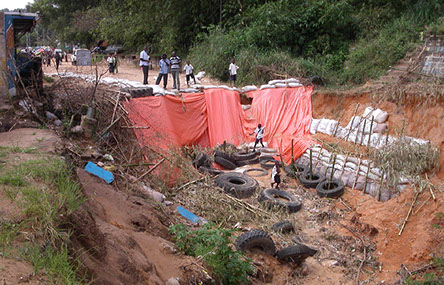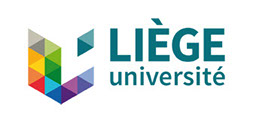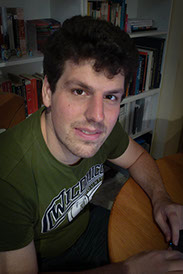
Matthias Vanmaercke
Bât. B11 Physical and Quaternary Geology Research group
Quartier Village 4
Clos Mercator 3
4000 Liège 1
Belgique
Tel.:+32 4 366 52 67
Email: matthias.vanmaercke@uliege.be
Background
xxx
The research of Matthias Vanmaercke focusses on understanding geomorphic processes at regional and continental scales, as well as the societal impacts of these processes. He is specialized in the geo-statistical analysis of erosion process measurements and the development of empirical models that simulate these processes. Most of his work focusses on Africa and Europe.
xxx
His recent achievements include the first comprehensive study on sediment export in Africa and the first study quantitatively showing that gully erosion rates worldwide are highly sensitive to climate change. The latter also provided a significant breakthrough in the modelling of gully erosion rates at global scales.
xxx
As a geographer, he has furthermore been involved in a variety of research projects dealing with a wide range of topics. His expertise includes hydrology, evaluating the effectiveness of soil and water conservation measures (Europe & Ethiopia), assessing the impacts of wetland encroachment on catchment sediment export (Uganda), identifying contrasts between recommended and implemented landslide mitigation measures (Central Africa) and simulating the urban expansion and social segergation of cities in sub-saharan Africa (e.g. The ASSURE model, Kampala, Uganda).
xxx
Some examples of his current research activities can be found here.
Carreer overview
2016 – …
2012 – 2016
2007 – 2012
2003 – 2007
April 2018
May 2017
May 2019
October 2007
Associate Professor
Université de Liège, Department of Geography
Post-doctoral Researcher
University of Leuven, Department of Earth and Environmental Sciences
Postdoctoral research grant from the Research Foundation Flanders (FWO)
PhD researcher
University of Leuven, Department of Earth and Environmental Sciences
Title PhD thesis: Sediment Yield from European Catchments: Exogenic, Endogenic and Anthropogenic Controls
PhD fellowship from the Research Foundation Flanders (FWO)
Master in Geography
University of Leuven, Faculty of Sciences
Title MSc. Thesis: “Magnitude and Dynamics of runoff and sediment transport in the Geba River Catchment, Northern Ethiopia”
Outstanding Early Carreer Scientist Award of the European Geoscience Union, Soil System Sciences division
Fellowship from the Japanese Society for the Promotion of Scienc
‘Prijs De Aardrijkskunde’: Prize of the Flemish Association of Geography Teachers
Prize of the KU Leuven Alumni Society of Geography
Publications
xxx
Selection of key publications
xxx
Vanmaercke M, Ardizzone F, Rossi M, Guzzetti F (2017). Exploring the effects of seismicity on landslides and catchment sediment yield: An Italian case study. Geomorphology 278: 171-183.
xxx
Vanmaercke M, Poesen J, Van Mele B, … , Yermolaev O (2016). How fast do hully headcuts retreat? Earth-Science Reviews 154: 336-355.
xxx
Vanmaercke M, Poesen J, Govers G, Verstraeten G (2015). Quantifying human impacts on catchment sediment yield: a continental approach. Global and Planetary Change 130: 22-36.
xxx
Vanmaercke M, Poesen J, Broeckx J, Nyssen J (2014). Sediment yield in Africa. Earth-Science Reviews 136: 350-368.
xxx
de Vente J, Poesen J, Verstraeten G, Govers G, Vanmaercke M, Van Rompaey A, Arabkhedri M, Boix-Fayos C (2013). Predicting soil erosion and sediment yield at regional scales: where do we stand? Earth-Science Reviews 127: 16-29.
Ongoing research projects
Prevention and Mitigation of Urban Gullies (PREMITURG): Lessons learned from Failures and Successes
xxx
Intense rainfall, inappropriate city infrastructure and lack of urban planning lead to the formation of large gullies in many cities in the Democratic Republic of Congo (DRC), but also many other tropical urban areas. Such urban gullies are clearly an understudied and underestimated geo-hazard. They are often formed in a matter of hours due to the concentration of rainfall runoff and, once formed, continue to expand during subsequent years. Given their nature and location in densely populated areas, they often claim casualties, cause large damage to houses and infrastructure and impede the development of many (peri-) urban areas. These problems directly affect the livelihood of perhaps more than a million of mainly poor people in DRC and may strongly aggravate as a result of rapid urban growth and climate change. Several initiatives already exist to stabilize existing gullies, but an estimated 50% of these measures fail. Furthermore, prevention receives very little attention.
xxx
The ARES-PRD project “PREMITURG” (2018-2023) aims to contribute to the prevention and mitigation of urban gullies by strengthening the research and decision-making capacity of Congolese universities and other stakeholders in disaster risk reduction. For this, we aim to (i) study the factors controlling this erosion process; (ii) identify the most effective/efficient prevention and mitigation measures (iii) study the societal and governance context of urban gullies as well as its influence on the prevention and mitigation of urban gullies; and (iv) valorize and appropriate the obtained research results.
xxx
This will mainly be done by the training of 3 MSc and 3 PhD students of DRC. Their research will focus on urban gullies and prevention and mitigation initiatives in Kinshasa, Bukavu and Kikwit. In Kinshasa, also the societal context of urban gullies will be investigated. Apart from the training of these students, the project will support local MSc studies and provide a range of prediction tools, field manuals, trainings, seminars and workshops to assist decision makers and other stakeholders in addressing this issue.
xxx
The central philosophy behind this project is that a lot can be learned from already existing initiatives aiming to prevent or mitigate urban gullies. These initiatives are taken by a wide range of actors and stakeholders, but often on an isolated basis. We aim to integrate and study these existing efforts. This will not only allow us to learn from their successes and failures, but will also increase interactions and synergies between the various actors and stakeholders involved with this problem. The insights obtained through this project will also be of great value to other tropical countries where urban gullies are a growing problem.
xxx
The project is lead by Prof. Matthias Vanmaercke (University of Liege, North-Coordinator) and Prof. Fils Makanzu Imwangana (Université de Kinshasa, South-Coordinator)
Distinctions and awards (selection)
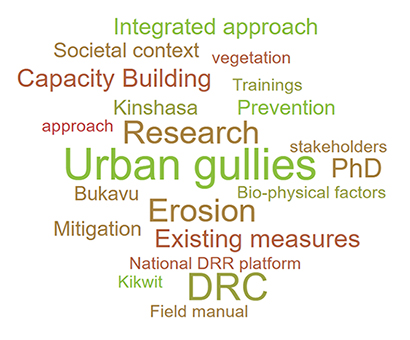
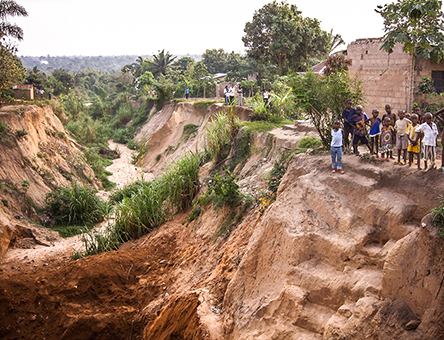
The PREMIURG project at a Glance
Example of an urban gully in Mbuji-Mayi, DRC (Sept. 2008)
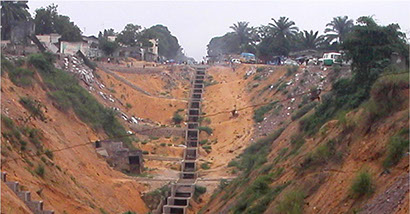
Examples of currently applied gully mitigation measures in Kinshasa (Makanzu Imwangana et al., 2014; 2015)
